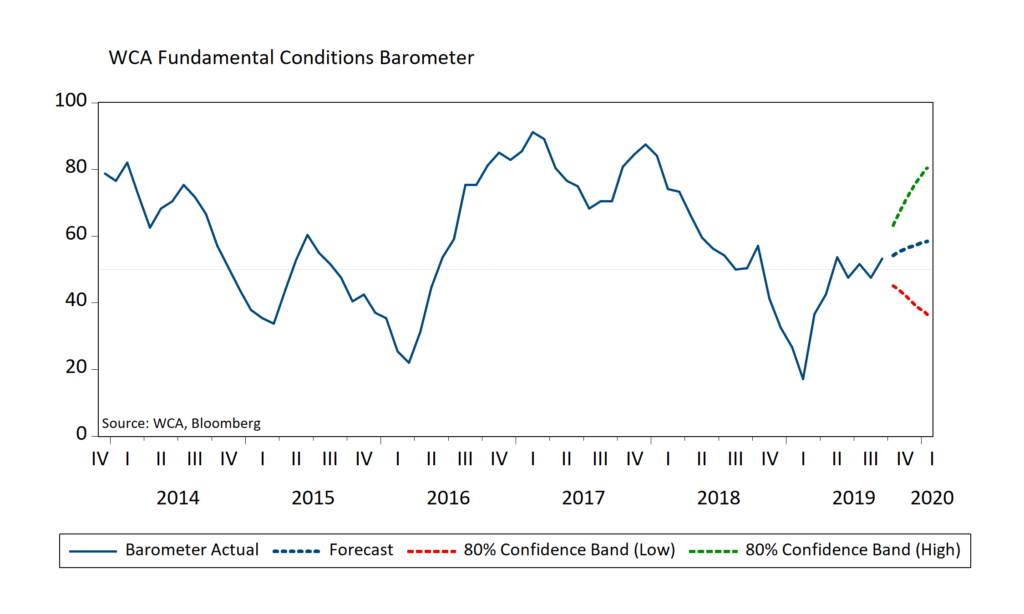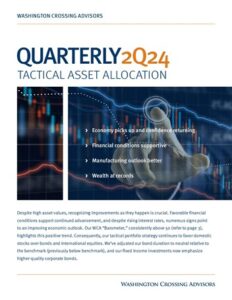Barometer Nudges Higher — Small Increase to Equity Allocation
The WCA Fundamental Conditions Barometer informs our near-term asset allocation decisions. The low barometer reading early this year mirrored the 4Q 2018 economic slowdown and supported an underweight equity position in our satellite portfolio. Rising economic momentum in the spring raised the barometer and prompted an increase in equity exposure. The reading has moved sideways over the last few months but edged up to 55 this month.
Mixed Bag
Economic releases have been a mixed bag recently. As noted by Ned Davis Research, there are many similarities to the slowdown of the early 1990s: (1) a recent global decline in the level and breadth of stocks, (2) interest rates and oil prices trending lower and (3) widening U.S. budget deficits and (4) a weakening U.S. dollar.
In contrast, more reasonable earnings expectations and fading recession fears have provided support for the recent slight uptick in our barometer. While about three-quarters of reporting companies have thus far beaten Q3 consensus earnings expectations, Q4 estimates have declined to more realistic levels. Also, the ISM Non-manufacturing index Business Activity Index rebounded in October. On balance, the barometer edged up in November, suggesting a slight increase in our satellite equity allocation to 55%.

High Yield Issuance and Spreads
On another note, Issuance in the high yield market is up significantly this year. Heavy issuance in the sector is consistent with the upward spike in total corporate debt accompanying the continued decline in bond yields. The current level of option-adjusted high yield spreads is currently near 4%, down about 70 basis points from 4Q 2018 levels. However, according to Goldman Sachs, defaults on high yield issues are on pace to reach a new high this year for the post-2008 crisis era. Energy issues have the highest default rates due to falling oil prices and weak growth sentiment in the sector. In August, WCA moved to underweight high yield.
Gold as an Effective Diversifier?
Gold appears to be a good portfolio diversifier for two reasons. First, gold prices and bond yields tend to be negatively correlated. Second, rising volatility regimes are usually favorable for gold and unfavorable for stocks. WCA increased its exposure to gold in August.
Conclusion
The latest bump up in our barometer is consistent with the last few month’s pattern of trendless, sideways readings. WCA would be more constructive on equities if there was progress toward a truce in the U.S. China trade war. We would become more defensive if prospects for global growth weaken. For now, the most recent set of data shows enough stability to allow for a small increase in equity allocation on a short-term tactical basis to a modest overweight.
Kevin
Caron, CFA, Senior Portfolio Manager
Chad Morganlander, Senior Portfolio Manager
Matthew Battipaglia, Portfolio Manager
Steve Lerit, CFA, Client Portfolio Manager
Suzanne Ashley, Analyst
(973) 549-4168
www.washingtoncrossingadvisors.com
www.stifel.com
Disclosures
WCA Fundamental Conditions Barometer Description: We regularly assess changes in fundamental conditions to help guide near-term asset allocation decisions. The analysis incorporates approximately 30 forward-looking indicators in categories ranging from Credit and Capital Markets to U.S. Economic Conditions and Foreign Conditions. From each category of data, we create three diffusion-style sub-indices that measure the trends in the underlying data. Sustained improvement that is spread across a wide variety of observations will produce index readings above 50 (potentially favoring stocks), while readings below 50 would indicate potential deterioration (potentially favoring bonds). The WCA Fundamental Conditions Index combines the three underlying categories into a single summary measure. This measure can be thought of as a “barometer” for changes in fundamental conditions.
The information contained herein has been prepared from sources believed to be reliable but is not guaranteed by us and is not a complete summary or statement of all available data, nor is it considered an offer to buy or sell any securities referred to herein. Opinions expressed are subject to change without notice and do not take into account the particular investment objectives, financial situation, or needs of individual investors. There is no guarantee that the figures or opinions forecasted in this report will be realized or achieved. Employees of Stifel, Nicolaus & Company, Incorporated or its affiliates may, at times, release written or oral commentary, technical analysis, or trading strategies that differ from the opinions expressed within. Past performance is no guarantee of future results. Indices are unmanaged, and you cannot invest directly in an index.
Asset allocation and diversification do not ensure a profit and may not protect against loss. There are special considerations associated with international investing, including the risk of currency fluctuations and political and economic events. Investing in emerging markets may involve greater risk and volatility than investing in more developed countries. Due to their narrow focus, sector-based investments typically exhibit greater volatility. Small company stocks are typically more volatile and carry additional risks, since smaller companies generally are not as well established as larger companies. Property values can fall due to environmental, economic, or other reasons, and changes in interest rates can negatively impact the performance of real estate companies. When investing in bonds, it is important to note that as interest rates rise, bond prices will fall. High-yield bonds have greater credit risk than higher-quality bonds. The risk of loss in trading commodities and futures can be substantial. You should therefore carefully consider whether such trading is suitable for you in light of your financial condition. The high degree of leverage that is often obtainable in commodity trading can work against you as well as for you. The use of leverage can lead to large losses as well as gains.
All investments involve risk, including loss of principal, and there is no guarantee that investment objectives will be met. It is important to review your investment objectives, risk tolerance and liquidity needs before choosing an investment style or manager. Equity investments are subject generally to market, market sector, market liquidity, issuer, and investment style risks, among other factors to varying degrees. Fixed Income investments are subject to market, market liquidity, issuer, investment style, interest rate, credit quality, and call risks, among other factors to varying degrees.
This commentary often expresses opinions about the direction of market, investment sector and other trends. The opinions should not be considered predictions of future results. The information contained in this report is based on sources believed to be reliable, but is not guaranteed and not necessarily complete.
Washington Crossing Advisors LLC is a wholly owned subsidiary and affiliated SEC Registered Investment Adviser of Stifel Financial Corp (NYSE: SF).



